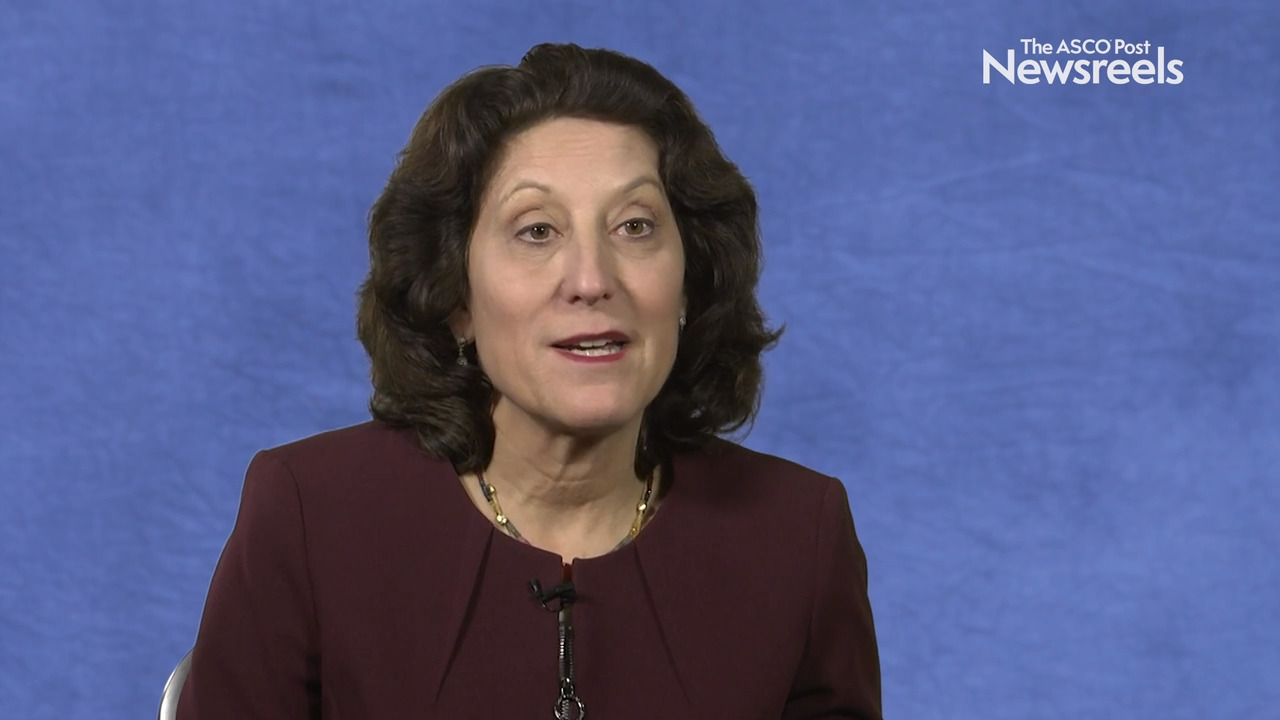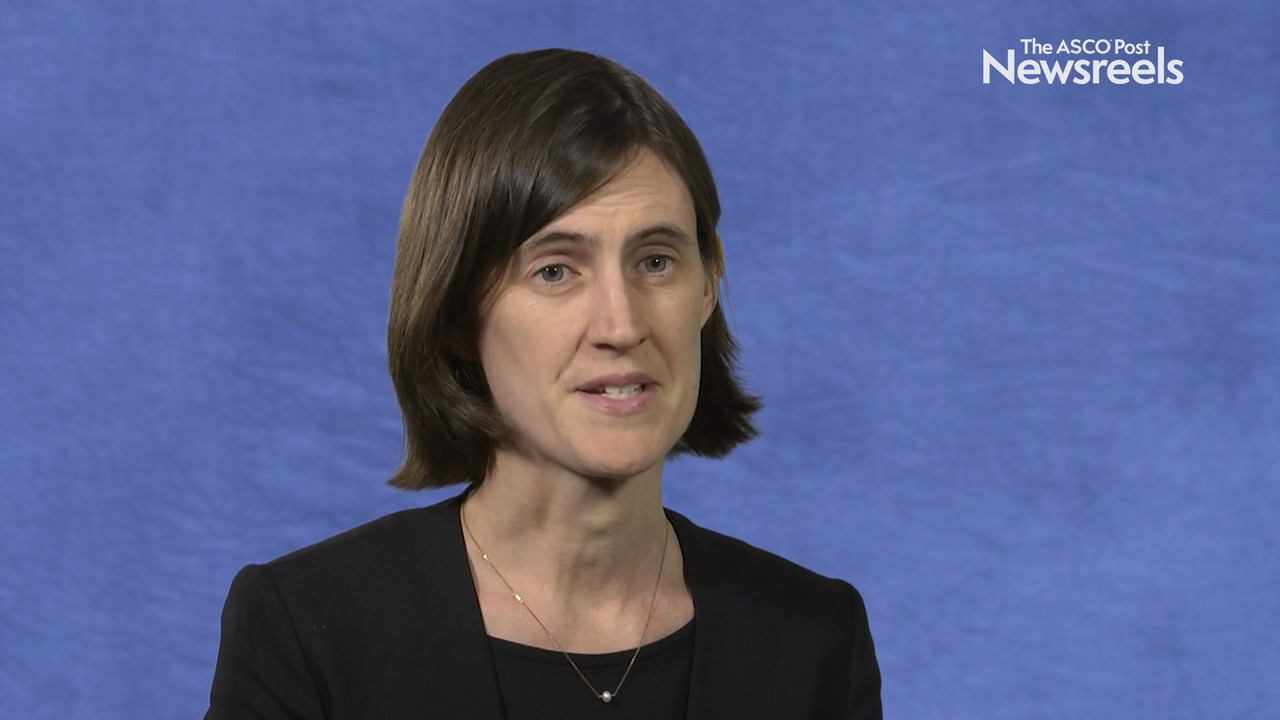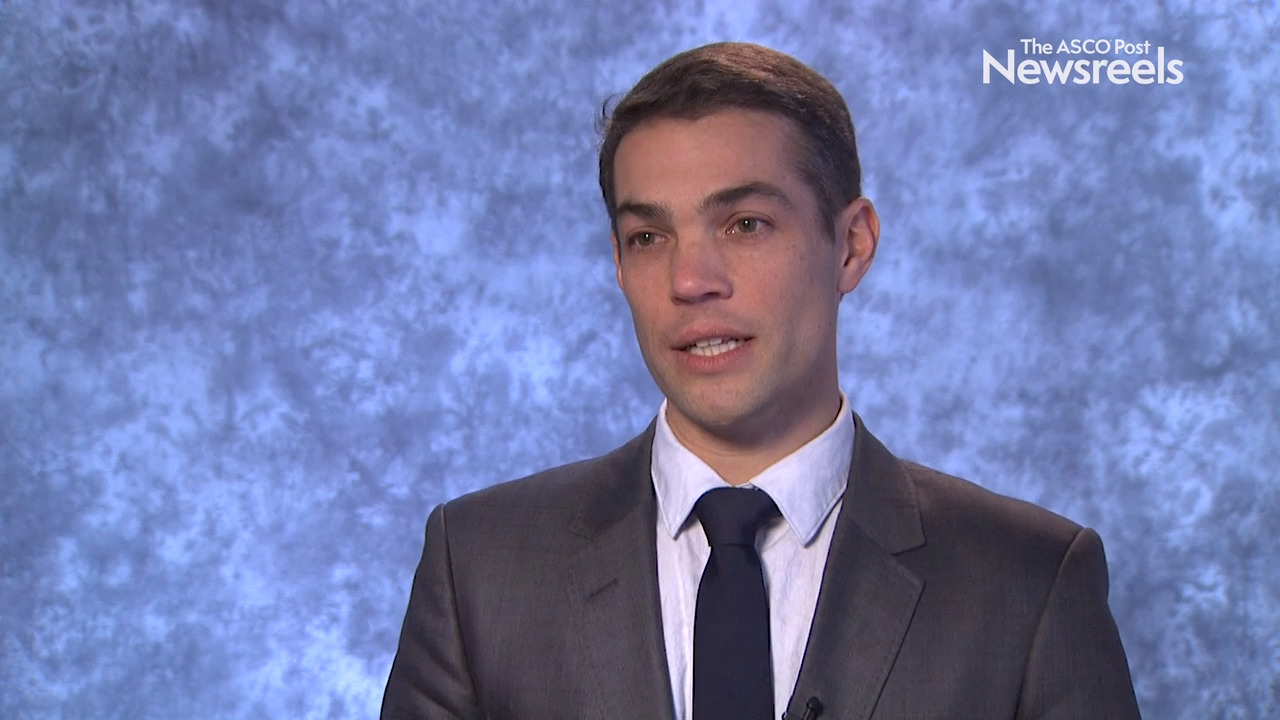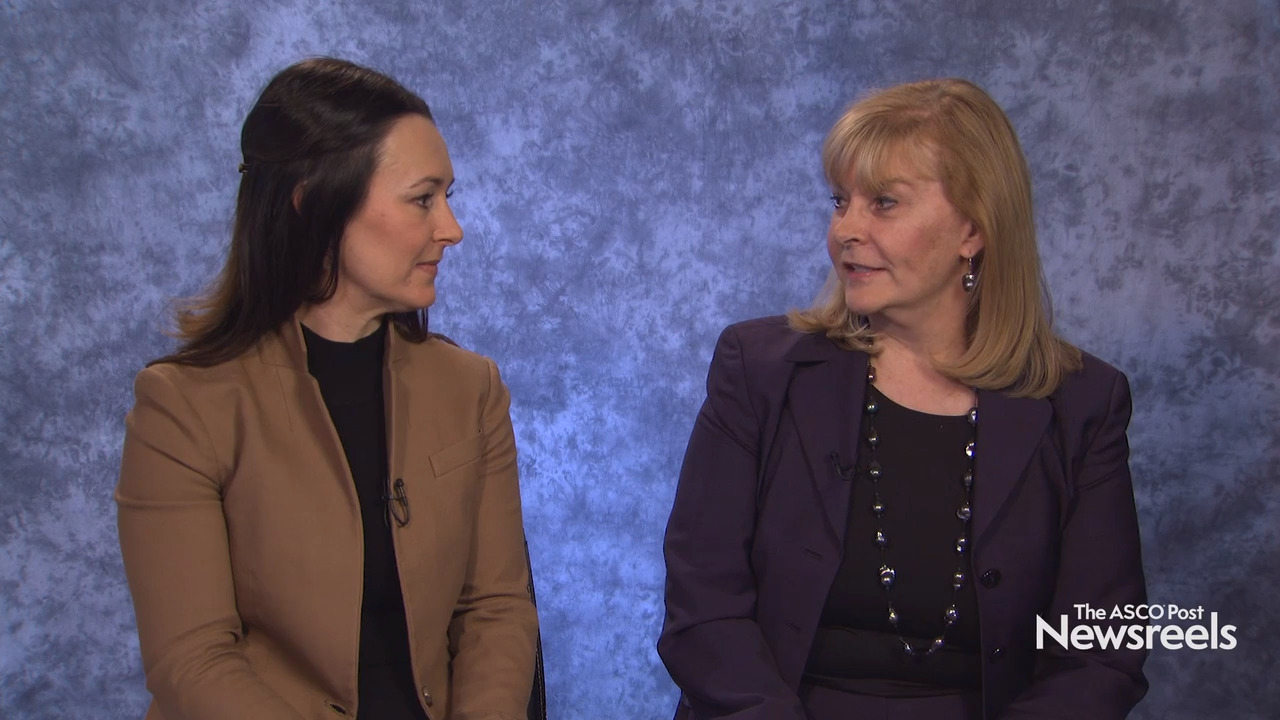2019 GI Cancers Symposium: Durvalumab, Tremelimumab, and Best Supportive Care vs Best Supportive Care Alone in Advanced, Refractory Colorectal Cancer
The phase II CCTG CO.26 trial evaluated whether the combination of durvalumab, a programmed cell death ligand 1 (PD-L1) inhibitor, and tremelimumab, an anti–cytotoxic T-lymphocyte–associated protein 4 (CTLA-4) antibody, plus best supportive care improved survival vs best supportive care ...
2019 GI Cancers Symposium: Pembrolizumab in Second-Line Therapy for Advanced Esophageal Cancer
Pembrolizumab significantly improved overall survival in the second-line setting of advanced esophageal cancer in patients whose tumors tested positive for programmed cell death ligand 1 (PD-L1) with a combined positive score (CPS) of 10 or greater. This was compared to investigator’s choice...
2019 GI Cancers Symposium: Nivolumab vs Nivolumab Plus Ipilimumab in Resectable Hepatocellular Carcinoma
Anti–programmed cell death protein 1 and anti–cytotoxic T-lymphocyte–associated protein 4 antibodies have shown activity in hepatocellular carcinoma. Based on these earlier findings, researchers sought to examine the safety, efficacy, and tolerability of perioperative treatment...
Study Finds High Tumor Mutational Load Is a Predictor of Response to Immunotherapy in Some Cancers
Although the emergence of immune checkpoint inhibitors over the last decade has revolutionized the treatment of patients with metastatic cancers, only a minority of patients experience long-lasting benefit from the therapy. A study investigating the association between tumor mutational burden and...
Is There a Benefit to Adding Rituximab to Methotrexate-Based Chemotherapy in Primary CNS Lymphoma?
In a phase III trial (HOVON 105/ALLG NHL 24) reported in The Lancet Oncology, Bromberg et al found no significant benefit of the addition of rituximab to high-dose methotrexate-based chemotherapy in patients with newly diagnosed primary central nervous system (CNS) lymphoma. Study Details In the...
VISTA Checkpoint Implicated in Pancreatic Cancer Immunotherapy Resistance
Researchers have identified a new potential immunotherapy target in pancreatic cancer, which so far has been notoriously resistant to treatment with immune checkpoint blockade drugs effective against a variety of other cancers. A research team from The University of Texas MD Anderson ...
Nivolumab in Relapsed or Refractory DLBCL Ineligible for or After Failure of Autologous Transplantation
In a phase II trial reported in the Journal of Clinical Oncology, Ansell et al found that nivolumab was associated with low response rates among patients with relapsed or refractory diffuse large B-cell lymphoma (DLBCL) who were ineligible for or experienced failure of autologous hematopoietic cell ...
Updated Survival Analysis of KEYNOTE-024: Pembrolizumab vs Platinum-Based Chemotherapy in Previously Untreated, Advanced NSCLC
As reported in the Journal of Clinical Oncology by Reck et al, an updated analysis of the phase III KEYNOTE-024 trial indicates continued overall survival benefit of first-line pembrolizumab vs platinum-based chemotherapy in patients with advanced non–small cell lung cancer (NSCLC) with a...
Molecular Profiles of BRAF-Mutant Melanomas and Response to Therapy
A study investigating the clinicopathologic features of BRAF V600E– and V600K–mutant melanomas and whether genotype affects response to immunotherapy found that the mutations not only have different clinical phenotypes, but also different molecular features and different...
MSI-H/dMMR Tumors in Prostate Cancer and Response to Immune Checkpoint Blockade
In a study reported in JAMA Oncology, Abida et al found that approximately 3% of patients with prostate cancer had microsatellite instability–high (MSI-H)/mismatch repair–deficient (dMMR) tumors and that some of these patients exhibited durable responses to treatment with immune...
Factors Influencing Response to Pembrolizumab in Various Advanced Cancers
In an analysis from the phase Ib KEYNOTE-028 trial reported in the Journal of Clinical Oncology, Ott et al found that response to pembrolizumab across different cancers was more likely in patients with higher tumor mutational burden, T-cell–inflamed gene-expression profile, and programmed...
Pilot Study of Intratumoral G100 in Merkel Cell Carcinoma
Multiple recent reports have addressed the activity of programmed cell death protein 1 (PD-1) inhibitors, such as pembrolizumab and avelumab, in Merkel cell carcinoma. However, approximately half of all patients who receive these agents do not maintain a persistent response. In an...
Immune Checkpoint Blockade and Tumor-Specific Vaccine for Incurable HPV16-Related Cancer
In a single-center phase II study reported in JAMA Oncology, Erminia Massarelli, MD, and colleagues found combining tumor-specific vaccine and nivolumab (Opdivo) showed evidence of activity in incurable human papillomavirus (HPV) 16–related cancer. The therapeutic vaccine, ISA 101, induces...
Stories of the Scientists Behind Immunotherapy
As the field of immunotherapy accelerates, so does the literature reporting on the path ahead. One of the newer books on the topic is A Cure Within: Scientists Unleashing the Immune System to Kill Cancer. It has a top-notch pedigree: the author, Neil Canavan, is a seasoned journalist with more than ...
Pembrolizumab in Sorafenib-Pretreated Hepatocellular Carcinoma
ON NOVEMBER 9, 2018, pembrolizumab (Keytruda) was granted accelerated approval for treatment of patients with hepatocellular carcinoma previously treated with sorafenib (Nexavar).1,2 Supporting Efficacy Data APPROVAL WAS BASED on durable responses in the phase II KEYNOTE-224 trial...
Illustrating Genius
FOUR AND A HALF YEARS AGO, author Neil Canavan attended a scientific conference to learn what he could about the then-emerging field of immunotherapy for cancer. After a presentation by Zelig Eshhar, PhD, principal investigator in the Department of Immunology at the Weizmann Institute of Science...
Durvalumab Improves Overall Survival After Chemoradiotherapy in Unresectable, Stage III NSCLC
AS REPORTED in The New England Journal of Medicine by Scott J. Antonia, MD, PhD, of H. Lee Moffitt Cancer Center and Research Institute, and colleagues, the phase III PACIFIC trial has shown significantly improved overall survival, a coprimary endpoint, with the programmed cell death ligand 1...
Optimal Duration of Checkpoint Inhibition in Melanoma Is No More Than 2 Years
For patients with advanced melanoma, the concept of treating to disease progression does not always apply. With many patients responding to checkpoint inhibition for years, when can treatment be safely discontinued? This important clinical question was addressed at the European Society for Medical...
Pembrolizumab Plus Chemoradiotherapy in HPV-Positive Head and Neck Cancer
The addition of pembrolizumab (Keytruda) to a chemoradiotherapy regimen yielded complete response rates of 85% in patients with human papillomavirus (HPV)-positive advanced squamous cell carcinoma of the head and neck. These findings from a phase Ib study were presented at the 2018 Society for...
Update on Immune Checkpoint Inhibitors
Checkpoint inhibitors have moved the field of immuno-oncology to the forefront of cancer treatment and research. However, these agents come with the risk of serious adverse events. To shed light on the toxicities associated with checkpoint inhibitors and other timely issues in the field of...
Immunotherapy-Related Toxicities May Be More Common Than Originally Reported
Immunotherapy has significantly improved the overall survival of patients with non–small cell lung cancer (NSCLC) and is generally better tolerated than traditional chemotherapies, but the results of a retrospective study suggested that immunotherapy side effects may be more common than initially...
ESMO Immuno-Oncology 2018: Second-Line Nivolumab vs Chemotherapy in SCLC
Treatment with nivolumab (Opdivo) did not improve response rates or survival over standard chemotherapy in patients with metastatic small cell lung cancer (SCLC) who relapsed following first-line treatment, according to findings presented by Reck et al at the European Society for Medical...
ESMO Immuno-Oncology 2018: OpACIN Trial: Neoadjuvant Ipilimumab Plus Nivolumab in Stage III Melanoma
Updated data of the OpACIN study, which studied combined ipilimumab (Yervoy) plus nivolumab (Opdivo) administered as neoadjuvant or adjuvant therapy in patients with high-risk stage III melanoma, demonstrated high response rates upon neoadjuvant therapy and promising long-term clinical outcome,...
ESMO Immuno-Oncology 2018: OAK Trial: Fast Progression in Patients With NSCLC Treated With Atezolizumab vs Chemotherapy
Overall survival (OS) was improved across all subgroups of patients with non–small cell lung cancer (NSCLC) who received atezolizumab (Tecentriq) compared with chemotherapy, including poor prognostic factors that were evaluated in an analysis of data from the OAK trial. Additionally, this...
Front-Line Daratumumab Combination Regimen Improves Outcomes in Multiple Myeloma
In patients with newly diagnosed multiple myeloma who are not eligible for stem cell transplantation, the addition of daratumumab (Darzalex) to lenalidomide (Revlimid) and dexamethasone significantly reduced the risk of death or disease progression by 44%, according to a late-breaking abstract...
Combining a Checkpoint Inhibitor With CAR T-Cell Therapy May Augment Immune Response
Chimeric antigen receptor (CAR) T-cell therapy is a revolutionary approach to treating hematologic malignancies. As experience with this strategy is gained, researchers are learning more about how to optimize responses, especially in patients with “immune exhaustion,” who have a suboptimal initial...
Early Studies of Ibrutinib Plus CAR T-Cell Combination in Chronic Lymphocytic Leukemia
Researchers are combining chimeric antigen receptor (CAR) T-cell therapy with ibrutinib (Imbruvica) as a means of augmenting and deepening responses in patients with relapsed or refractory chronic lymphocytic leukemia (CLL). Two pilot studies presented at the 2018 American Society of Hematology...
Cornelis Melief, MD, PhD, Receives 2018 ESMO Immuno-Oncology Award
The European Society for Medical Oncology (ESMO) has selected Cornelis Melief, MD, PhD, to receive the ESMO 2018 Immuno-Oncology Award in recognition of his work studying the interactions of the immune system with cancer. Dr. Melief is Professor Emeritus in Tumor Immunology at the Leiden...
ESMO Immuno-Oncology 2018: Does Proton Pump Inhibitor Therapy Impact the Efficacy of Nivolumab Plus Ipilimumab?
Patients with melanoma receiving proton pump inhibitors for comorbidities derived approximately half the clinical benefit from immunotherapy consisting of nivolumab (Opdivo) plus ipilimumab (Yervoy) as patients receiving the same combination but not treated with proton pump inhibitors, according to ...
ESMO Immuno-Oncology 2018: MYSTIC: First-Line Durvalumab With or Without Tremelimumab in Metastatic NSCLC
First-line immunotherapy with durvalumab (Imfinzi) or the combination of durvalumab and tremelimumab does not improve overall survival in unselected patients with lung cancer, according to late-breaking results from the MYSTIC trial presented by Rizvi et al at the European Society for Medical...
ESMO Immuno-Oncology 2018: KEYNOTE-010: Long-Term Treatment With Pembrolizumab in Previously Treated NSCLC
Patients with previously treated, advanced non–small cell lung cancer (NSCLC) who received pembrolizumab (Keytruda) showed significantly longer overall survival (OS) compared to those treated with docetaxel, Herbst et al reported at the ESMO Immuno-Oncology Congress 2018 in Geneva,...
Pembrolizumab vs Standard of Care in Recurrent or Metastatic Head and Neck Squamous Cell Carcinoma
In the phase III KEYNOTE-040 trial reported in The Lancet, Cohen et al found that pembrolizumab (Keytruda) was associated with a “clinically meaningful prolongation of overall survival” vs investigator’s choice of standard therapies in patients with previously treated recurrent or ...
ECHELON-2: Brentuximab Vedotin Plus Chemotherapy in CD30-Positive Peripheral T-Cell Lymphoma
As reported by Horwitz et al in The Lancet, the phase III ECHELON-2 trial showed that brentuximab vedotin (Adcetris) plus cyclophosphamide, doxorubicin, and prednisone (CHP) improved progression-free and overall survival vs cyclophosphamide, doxorubicin, vincristine, and prednisone (CHOP) in...
Primary Resistance to Immune Checkpoint Inhibitors in Metastatic Colorectal Cancer and Misdiagnosis of MSI or dMMR Status
In a study reported in JAMA Oncology, Cohen et al found evidence that primary resistance to immune checkpoint inhibitor treatment in metastatic colorectal cancer (CRC) can be explained in some cases by misdiagnosis of microsatellite instability (MSI) or defective mismatch repair (dMMR) status....
FDA Pipeline: New Priority Reviews, Designations, and Clearances, Plus Statements on Genetic Testing and Class Labeling
The U.S. Food and Drug Administration (FDA) recently issued the following new approvals and designations: Priority Review for Atezolizumab in Combination With Chemotherapy for the Initial Treatment of Extensive-Stage SCLC The FDA accepted a supplemental biologics license application...
Bladder Cancer: Strategies to Address Checkpoint Inhibitor Failure
CHECKPOINT INHIBITORS have rapidly become the standard of care as second-line treatment, and in some patients first-line treatment, of advanced bladder cancer. However, the majority of patients do not respond and eventually experience disease progression; these patients will need subsequent...
Expert Point of View: Julien Taieb, MD
JULIEN TAIEB, MD, Professor of Medicine at Paris Descartes University in France, said the MODUL cohort was based on a clear rationale for adding atezolizumab (Tecentriq) to bevacizumab (Avastin) in the metastatic colorectal cancer setting. In immunodeficient mice, the combination of an...
No Benefit for Atezolizumab Plus Standard of Care for Maintenance in Colorectal Cancer Subset
ADDING ATEZOLIZUMAB (Tecentriq) to a fluoropyrimidine plus bevacizumab (Avastin) did not improve outcomes for patients with BRAF wild-type metastatic colorectal cancer enrolled in the umbrella MODUL trial.1 “Despite activity in other, immune-responsive tumor types, there was no improvement in...
Expert Point of View: Reinhard Dummer, MD
KEYNOTE-022’S invited discussant, Reinhard Dummer, MD, Professor of Dermatologic Oncology at the University Hospital Zurich Skin Cancer Center in Switzerland, told attendees, “We’ve been waiting for this small prospective randomized phase II trial, and the initial results appear very promising.”...
Pembrolizumab Triplet Shows Activity in BRAF-Mutant Melanoma
AS FIRST-LINE treatment of advanced BRAF-mutant melanoma, pembrolizumab (Keytruda) added to dabrafenib (Tafinlar) and trametinib (Mekinist) produced a nonsignificant improvement in progression-free survival. It also increased the rate of grade 3 to 5 treatment-related adverse events in the phase II ...
Expert Point of View: Aung Naing, MD, FACP
AT THE 2018 Society for Immunotherapy of Cancer (SITC) Annual Meeting, Aung Naing, MD, FACP, of the Department of Investigational Cancer Therapeutics at The University of Texas MD Anderson Cancer Center, Houston, commented on studies evaluating novel drugs to be combined with programmed cell death ...
Beyond Checkpoint Inhibitors: Novel Immunotherapy Combinations With Antitumor Activity
THE 2018 Society for Immunotherapy of Cancer (SITC) Annual Meeting hosted a meeting of the minds of the world’s premier cancer immunologists. In addition to the cutting-edge laboratory science explored and presented at the meeting, numerous phase I clinical trials and a few phase II studies offered ...
Hope S. Rugo, MD, on Immunotherapy for Breast Cancer: Expert Perspective
Hope S. Rugo, MD, of the University of California, San Francisco, summarizes a spotlight session she chaired, which included discussion of new immunotherapy drug combinations, predictive factors, and the immune microenvironment.
Roisin M. Connolly, MD, on Breast Cancer Treatment Advances in 2018: Expert Perspective
Roisin M. Connolly, MD, of the Sidney Kimmel Comprehensive Cancer Center at Johns Hopkins, discusses clinical trials during the past year on studies on CDK and PI3K inhibitors in estrogen receptor–positive breast cancer and immune checkpoint agents in triple-negative breast cancer.
FDA Approves Atezolizumab in Combination With Bevacizumab and Chemotherapy for First-Line Treatment of Metastatic, Nonsquamous NSCLC
On December 6, 2018, the U.S. Food and Drug Administration (FDA) approved atezolizumab (Tecentriq) in combination with bevacizumab (Avastin), paclitaxel, and carboplatin for the first-line treatment of patients with metastatic, nonsquamous non–small cell lung cancer (NSCLC) with no EGFR or...
Current Perspectives on the Treatment of Breast Cancer
“We are on the cusp of a new way to treat breast cancer,” Mary L. (Nora) Disis, MD, said in summarizing advances using immunology to treat breast cancer. Immune checkpoint inhibitors, adaptive T-cell therapies, and vaccines can enlist and rev up the immune system and be combined with chemotherapy...
ASH 2018: Ibrutinib Plus Rituximab vs Standard Chemoimmunotherapy in Younger Patients With Treatment-Naive CLL
A 6-month course of chemotherapy-based treatment with FCR (intravenous fludarabine and cyclophosphamide plus rituximab [Rituxan]) has historically been the most effective treatment for chronic lymphocytic leukemia (CLL), especially in patients 70 years of age and younger. However, results from a...
ASH 2018: CAR.CD30 T-Cell Therapy in Relapsed or Refractory CD30-Positive Lymphomas
At the 2018 American Society of Hematology (ASH) Annual Meeting & Exposition, Grover et al presented preliminary results from a clinical study of an investigational cellular immunotherapy for Hodgkin lymphoma and non-Hodgkin lymphoma expressing the CD30 protein marker (Abstract 681). Data...
Saar I. Gill, MD, PhD, on CLL: Trial Results on Anti-CD19 CAR T Cells
Saar I. Gill, MD, PhD, of the University of Pennsylvania, discusses findings from a prospective clinical trial on the high response rate in patients with chronic lymphocytic leukemia who received a combination therapy of CAR T cells plus ibrutinib (Abstract 298).
Julie Vose, MD, MBA, and Loretta J. Nastoupil, MD, on Large B-Cell Lymphoma: Real-World Experience With CAR T-Cell Therapy
Julie Vose, MD, MBA, of the University of Nebraska Medical Center, and Loretta J. Nastoupil, MD, of The University of Texas MD Anderson Cancer Center, discuss findings from a multicenter study of axicabtagene ciloleucel CD19 CAR T-cell therapy for relapsed or refractory aggressive B-cell lymphoma when used as a standard of care (Abstract 91).




